Interview with Nina B. Lichtenstein
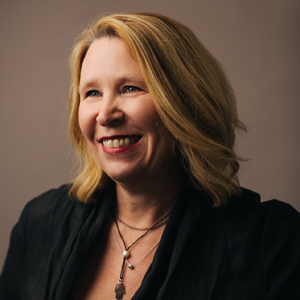
Nina Lichtenstein! When I hear the name I immediately think of bold, beautiful, vibrant energy! That is Nina! She and I met a few years ago at Hippocamp, Hippocampus Magazine’s wonderful nonfiction writers’ conference, where she taught a workshop on writing the body. I was thrilled when she submitted an essay for Awakenings, and we have been in touch pretty regularly since. Nina is a wonderful example of a woman who dreams–and then does what it takes to manifest those dreams. She’s not afraid of change and always embraces life with gusto! Please join us in conversation–and then maybe join her in Maine for Embodied Stories: A Fall Weekend Writing Retreat for Women in October! (And if you like a sophisticated cocktail every now and then, Nina shares her favorite Manhattan recipe too!)
Diane: Welcome, Nina! I’m so happy to speak with you today! You’re an amazing example of a woman rediscovering herself—several times over! I just love your enthusiasm, your go-for-it energy, your honesty and generosity, and I’m excited about your new projects! We’ve talked before about our mutual tendency to take on too many.
I may have always been like this, but I’m more so now that I’m older. I hear the clock ticking, and there are so many things I want to do before it stops. It doesn’t feel sad or scary—more like a gift to be able to fully appreciate that there are still a lot of things I want to do. Is this something that you feel as well?
Nina: Yes. And then the fact that we actually wake up in the morning! I’ve started to actually say Modeh Ani, the little Jewish prayer that we say when we wake up, thanking God or the Universe for returning our souls to us after a night’s sleep. Because as we age, and I’m 58 now, I just don’t take things for granted the way I did when I was younger.
And yes—I get excited about new projects!
“I Call Myself a Recovering Academic”
 Diane: I know you have one. Tell us about Maine Writers Studio.
Diane: I know you have one. Tell us about Maine Writers Studio.
Nina: When I turned 40, I had 40 women for a sit-down dinner in my living room. A next-door neighbor, a retired professor from Wesleyan, gave me this big fat coffee table book called Jewish Women and Their Salons. And it was a beautiful book about how historically Jewish women have had salons as part of their curiosity about art and literature and commitment to foster community through conversations.
Diane: So, a lot of my readers are probably thinking mani-pedis right now. That’s what I usually think of when I hear the word salon.
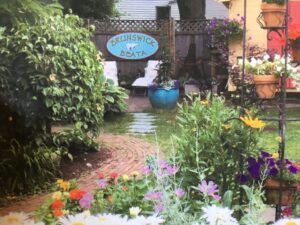 Nina: So literary salons. Conversation, community connections around literature, culture, that kind of stuff. Art, of course, too. I thought it was interesting that she gave me that book. She probably experienced me as a connector and a person who was outgoing and enjoyed gathering people. And as someone enjoying literature, what with my PhD in French literature and all. I think that planted a little seed—I always thought if I had lived in a different era, I probably would’ve been one of those women.
Nina: So literary salons. Conversation, community connections around literature, culture, that kind of stuff. Art, of course, too. I thought it was interesting that she gave me that book. She probably experienced me as a connector and a person who was outgoing and enjoyed gathering people. And as someone enjoying literature, what with my PhD in French literature and all. I think that planted a little seed—I always thought if I had lived in a different era, I probably would’ve been one of those women.
When I moved to Maine in 2016, I was newly divorced. I left West Hartford, Connecticut, a wonderful community and a great place to raise children. I also left academia at that point.
I call myself a recovering academic. After my PhD, I had done lots of adjuncting. I was never able to tap into a full-time academic job and was dispirited really with working so hard and be so dedicated and get paid kishkis. So, in Maine, I enrolled in an MFA program and pivoted toward creative writing, where I was really able to develop my own, unique voice.
“We Do An Interview in Front of the Audience. It’s Very Salon-like. It Feels Like a Pub or Café Where Everyone Has Something in Their Glass”
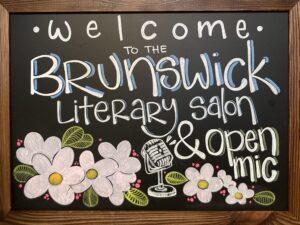 My friend Jennifer Friedman Lang invited me to teach at her Israel Writer Studio when I lived in Tel Aviv. I liked what she was doing and how she created community around Anglo writers. I felt inspired.
My friend Jennifer Friedman Lang invited me to teach at her Israel Writer Studio when I lived in Tel Aviv. I liked what she was doing and how she created community around Anglo writers. I felt inspired.
There’s the very established and well-known Maine Writers and Publishers Alliance MWPA, which runs a lot of programming and has great funding. It’s based in Portland, about half an hour from where I live. There was nothing close by in Brunswick, so I said, “Israel Writers Studio, how about Maine Writers Studio?” And last June, I launched it. I run a bi-monthly literary salon and open mic, which is hosted at a historic inn about a four-minute walk from my house. I also bartend there two nights a week, which gets me out of the house and out of my writing head.
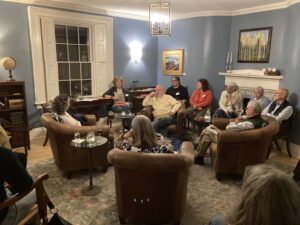 I always invite an author who has published a book, and we do an interview in front of the audience. It’s very salon-like. It feels like a pub or a cafe where everyone has something in their glass, and then they’re invited to engage with the author as well. The author reads, we discuss their project and craft, we take a break, and then anyone who wants to read from their work drops their name into a hat. During the second half of the evening, we do the open mic. Everyone gets five minutes to read.
I always invite an author who has published a book, and we do an interview in front of the audience. It’s very salon-like. It feels like a pub or a cafe where everyone has something in their glass, and then they’re invited to engage with the author as well. The author reads, we discuss their project and craft, we take a break, and then anyone who wants to read from their work drops their name into a hat. During the second half of the evening, we do the open mic. Everyone gets five minutes to read.
I also offer writing workshops through Maine Writers Studio; we just did one on writing about our mothers, and last fall one on “writing the body.” I also have a writing retreat writing the body planned for the fall, in an idyllic setting right on the wild, Maine ocean.
“I Use the Body Parts as a Portal into Muscle and Emotional Memory”
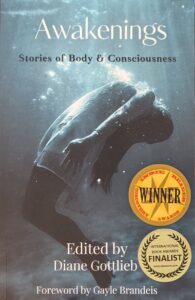 Diane: I learned about your interest in body writing when we first met at Hippocamp—the creative nonfiction writing conference hosted by Hippocampus Magazine. I’m so grateful that you submitted your gorgeous piece “Belly” to Awakenings.
Diane: I learned about your interest in body writing when we first met at Hippocamp—the creative nonfiction writing conference hosted by Hippocampus Magazine. I’m so grateful that you submitted your gorgeous piece “Belly” to Awakenings.
I read your piece on the skin in HerStory and loved it, too! Tell us about your book coming out next year.
Nina: For some reason, in my graduate program, I started writing about memories as they presented themselves through a given body part. I woke up one night when I was in my first semester with a real bad hip pain. I had just lost a friend to ovarian cancer, so I was immediately like, “Oh my God, here it is coming for me.” I had heard how ovarian cancer presents—you don’t have pain in that region. It’s everywhere else. Like your neck is sore, so you go to a chiropractor. And then three months later it’s already too late to do much about the cancer. I started to write about my hips, and then my advisor said, this is great stuff. Give me more.
That’s how Body: My Life in Parts got its start. It is a collection of essays, with each chapter named for a body part. I use the body parts as a portal into muscle and emotional memory, and sometimes the body part becomes a metaphor.
“I Push It Further, Like Having Skin in the Game … Specifically in This Case, the Motherhood Game”
So for example, the piece about skin. (You can listen to Nina read it by clicking above!) I talk about stretch marks and moles and all the sunburns I’ve suffered throughout my young life and adolescence, when our mothers sat with the foil under their chins and used Baby Oil to sizzle in the sun.
And then I push it further, like having skin in the game, which was part of what I was writing about. Having skin in the game, specifically in this case, in the motherhood game, or in being a convert to Judaism and what this means, what you give up, what you gain, the challenges. Similarly, for example, in the chapter called eyes, it’s as much about what I see, as the awareness that developed in me as a child, and also about being seen.
Diane: Wow, I love that.
Nina: The book gives little portals into a life. I don’t have a memoir or story in me that is specifically fueled by a life trauma. I didn’t grow up in a country of war. I haven’t experienced natural disaster. I grew up in a family with parents who loved me and supported me. I have stories in my book about what it was like growing up as a latchkey kid in Oslo in the 1970s when you were pretty much left to your own devices, and how I probably would’ve preferred less freedom and more structure. More present parents. So, through this writing, I realized that while I was never abused as a child, I was abandoned, in a daily life kind of way. And that this alone-ness and loneliness made me a contact-seeking child.
“One of the Things I Have Learned about My Own Trajectory through My Writing Is Why I’ve Made the Choices I Have Made in My Life”
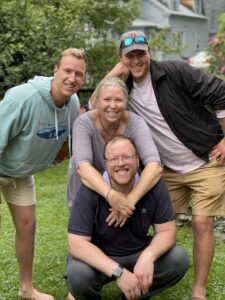 Diane: Your latchkey childhood informed your mothering, right? You wanted to give your children what you missed.
Diane: Your latchkey childhood informed your mothering, right? You wanted to give your children what you missed.
Nina: Exactly. And so, I always come back to this question: is writing memoir just navel gazing? Or are we actually looking for answers and looking to learn and grow? One of the things I have learned about my own trajectory through my writing is why I’ve made the choices I have made in my life, and what caused my reactivity or sensitivities. And that’s insight that I would not want to be without.
Diane: That’s wonderful.
Nina: Yeah, it is valuable to have this insight. It makes me also more aware of how my three sons will likely make choices very different from the ones they saw modeled at home or that I would prefer. I know that it wasn’t easy for my parents in Oslo, Norway to see that their daughter went through an Orthodox conversion to Judaism and started talking about kosher this and kosher that. And my mom was like, “Well, can’t you celebrate Christmas and Hanukkah?” And I was like, yeah, sure, but that’s not what I’m going to do. I’m sure this was very hard for them, but they never gave me any sort of guilt trip or didn’t make me feel like I was betraying them.
“I Would Like to Write the Book I Wish I Had When I Went Through My Conversion”
Diane: So is your conversion what you talk about in your next book, The Viking Jewess?
Nina: Yes. That book is a work in progress. It has not been completed, let alone shopped around. But it felt like a natural place to go next. Primarily, I would like to write the book I wish I had when I went through my conversion. When I was going through this process, I felt alone, and missed the feeling of a community. I wasn’t part of a big group in a big synagogue where you met for classes. I just met one-on-one with a rabbi for two years. And I took several Jewish studies courses at the university.
Another thing about aging and experience, which will also be part of writing about my conversion journey, is that the way things turn out is not how we imagined they would in the beginning. Life is one continuous string of evolutions and revolutions and change. We adjust and we tweak. I live a very different Jewish life here in Maine than I did in West Hartford, where there were 19 synagogues.
Diane: What you just described about life is also very much a description, at least for me, of what happens when I sit down to write something. I think, oh, I’m going to write about this, but it ends up taking its own path. I think that’s really exciting because in life and in writing—and in everything—we can’t always foresee the possibilities out there.
So, here’s another wonderful thing in your life. You are a newlywed!
Nina: I am!
“This Whole Concept of Carpe Diem. We Put It Up Front and Center. We Don’t Put Things Off.”
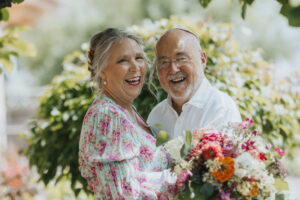 Diane: Is the honeymoon over?
Diane: Is the honeymoon over?
Nina: No, actually, we just came back from Aruba last week.
We’ve been a little sneaky. We’ve had a few honeymoons. We keep calling any trip we take “our honeymoon.”
I married someone who had been like an intellectual soulmate since I was 22 years old. He’s 27 years older than I am. That has brought an awareness to not just my daily life, but as a couple, this whole concept of carpe diem. We put it up front and center. We don’t put things off.
Diane: I think that’s important for everybody to do.
Nina: We got married in our backyard here in Maine. We had our chuppah there with my four best girlfriends from Norway each holding one of the poles.
Diane: Oh, that’s lovely.
Nina: My husband Tony is really special. He has six grown children who all are, or have been, married and have children. So he has a huge family. One of his daughters got up at our wedding to say a few words and said, “I used to be one of six, and now I’m one of nine.”
Diane: That’s so lovely. I remember when we were doing the edits for Awakenings, you we like, “Oh, I’m getting married, but I can make that deadline.”
Wedding schmedding, right? I got a deadline.
“I Wanted to Be More Creative, Be Truer to My Own Voice, and Express Things That Matter to Me.”
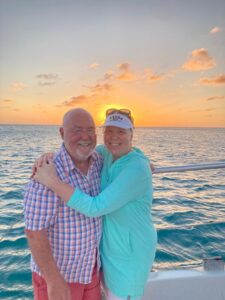 Nina: I love it. Wedding Schmedding.
Nina: I love it. Wedding Schmedding.
I do want to mention one thing. When I grew up, English was not my first language. Norwegian was, and although we start learning English in elementary school, I pursued degrees in the States in French because I had learned French in Norway also, and I had lived in France a little bit. I always did okay writing in English, and I found a comfortable home in academia because prose writing in academia had certain boundaries, certain structure. When I was going through my divorce and started writing personal essays, I discovered a voice that I hadn’t been allowed or able to express as freely in “academese.” And when a few of those early personal essays were picked up and published in The Washington Post, The Huff Post, and some other good outlets, I felt not just the gratitude but that it was gratifying.
Academic writing started to feel constrictive. I wanted to be more creative, be more true to my own voice, and express things that matter to me. When I was living in West Hartford, CT., raising my kids, I had just finished my PhD. There were no jobs in French, but an adjunct position opened up in the English department.
Now, here’s someone with a PhD in French whose mother tongue is Norwegian. And I went into the director’s office and I said, “If you need someone, I’m happy to step in.” I added, “I can teach literature and stories and writing in many languages, and I know how to engage students.” And the person just looked at me and said, “Okay.” They say it’s all about location, location, location, but it’s really timing, right?
Diane: Yes!
“Sometimes It Takes Me a Really Long time to Find Words, But this Is All Part of My Writer’s Evolution, A Journey That Was Not Very Straightforward.”
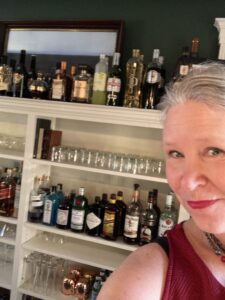 Nina: Timing. For four or five years, I taught English composition to undergraduates at UCONN. And during those years, I learned as much as my students. They didn’t know I didn’t have a PhD in English. They didn’t know that I had never read the things coming up through the university system that I was teaching them. I was always just a few steps ahead. But through those semesters teaching English composition (and the love of literature, as I like to say), I gained the confidence to apply to the MFA program.
Nina: Timing. For four or five years, I taught English composition to undergraduates at UCONN. And during those years, I learned as much as my students. They didn’t know I didn’t have a PhD in English. They didn’t know that I had never read the things coming up through the university system that I was teaching them. I was always just a few steps ahead. But through those semesters teaching English composition (and the love of literature, as I like to say), I gained the confidence to apply to the MFA program.
Oftentimes I’ll look for words in English. First, it’s the word in French, and then it comes in Norwegian. Now it’s Hebrew or Spanish that fight for their space. Sometimes it takes me a really long time to find words, but this is all part of my writer’s evolution, a journey that was not very straightforward.
Diane: I love stories about windy journeys! I think they’re so much more interesting and satisfying than the straight paths.
So, Nina. I have one last thing. You said you’re a bartender. What’s your favorite drink to make? And will you give us a recipe?
Nina: Of course! It’s called Elliot’s Manhattan, and not only is it my fave to make but also to enjoy! At our inn, there is a regular guest, Elliot, who likes his Manhattans a certain way. It’s not your typical Manhattan with some bourbon, some good vermouth, and a few dashes of bitter. It also mixes rye with bourbon. It has one ounce of rye and two ounces of bourbon, and it uses the really good quality red vermouth.
“This May Sound Weird, But When I Walk Into the Pub … I Fell Like I’m Communing With My Father”
I bartend two nights a week, and I love that I leave my little third floor turret where I sit and write in isolation. Bartending is such a great way to meet people, to hear stories and see different types of characters.
My dad was a bit of a barfly, and later in life, he drank too much. I loved him, and he was a great father. This may sound weird, but when I walk into the pub, there’s a special smell behind the counter where we have all our mixers and all that. As I stand there mixing drinks, and people are sitting at the actual bar, not just in the room of the pub, I feel like I’m communing with my father. It’s like he’s there with me.
Diane: I love that. Sounds like it could make a great essay! So let’s end with that—and with your recipe. Thanks so much for sharing your journey with us!!
Elliott’s Manhattan
1 oz Bullitt Rye
2 oz Bullitt Bourbon
1 oz Carpano Antica Formula Vermouth
3 dashes of Angostura Aromatic Bitters
A splash of Luxardo
Half a bar spoon cherry juice
Garnish: 1 Bada Bing cherry or Luxardo Maraschino cherry
Add all ingredients in a cocktail shaker half full with ice & stir until liquid is cold (I prefer to shake it
vigorously because I like it aerated) – pour into (frozen) martini glass & garnish with one cherry
Nina’s memoir Body: A Life in Parts is forthcoming from Vine Leaves Press in May 2025. She is also the author of Out of North Africa: Sephardic Women’s Voices (Gaon Books, 2017). You can find out more about Nina’s work here, and about Maine Writers Studio and the upcoming fall retreat here. Follow her on Instagram @VikingJewess, and you can check out her “Glorious Converted 1865 Barn” AirBnB in Maine here.
As always, I’d love to hear from you. Please write a comment or send me an email.
See you soon!
XOXOXO
Diane



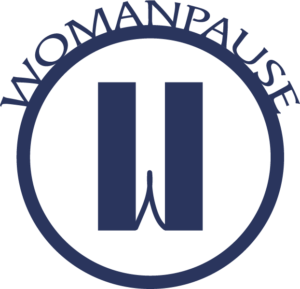
This was such a fantastic interview! She is such a wonderful soul.
Thanks, Kate! And yes, Nina is wonderful!!
Awww you. Thank your reading, Kate!
Great interview! I love the long and winding road, and I also love that Nina’s current writing wouldn’t have been possible without it. So interested in what went into Nina’s conversion to Judaism, too, and I hope I can read more about that somewhere. Thank you both!
Thanks so much, Alison! And YES to those long and winding roads! Nina’s next book (WIP) is all about her conversion. I can’t wait to read it too!!!
Alison, you are right, that loooong windy road which sometimes feels “hopelessly” wasteful…itinerant…unsettled…is of course part of what has made me and my writing what it is. Such a good way to look at it. And for the conversion journey: stay put – the next memoir manuscript about that is in process! 😉
What a great interview! I love Nina’s nuanced observation that, although her parents were loving, she felt abandoned. My equivalent–I also had loving parents who kept me safe, but I felt unprotected, a feeling I still carry with me. Also, thanks for the Manhattan recipe!
I hear you, Karen, and thanks so much for sharing this. I know Nina’s experience is one that many of us can relate to. I think hearing from others like Nina is a wonderful balm. And yay for the recipe!!
Oh I love this conversation so much! Some of my favorite takeaways…
Nina: “my mom was like, “Well, can’t you celebrate Christmas and Hanukkah?” And I was like, yeah, sure, but that’s not what I’m going to do.”
Diane: “What you just described about life is also very much a description, at least for me, of what happens when I sit down to write something. I think, oh, I’m going to write about this, but it ends up taking its own path. I think that’s really exciting because in life and in writing—and in everything—we can’t always foresee the possibilities out there.”
So heartening to me to hear the ways people approach their lives… opens up how I may consider my own writing and life the surprising places and unimaginable possibilities both our lives and our writing can take us when we can just listen and follow where it wants to go. Thanks for sharing and for this space to model all kinds of ways to be in the world.
Thanks you, Michelle, for your thoughtful takeaways! I also LOVE hearing how others listen to that voice inside and follow its lead! I am reminded of the wonderful time Nina and I had as guests on your podcast and the great joy it was to interview you and hear about your path–and detours. We all end up just where we need to be! Thanks so much, again!!